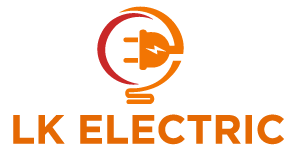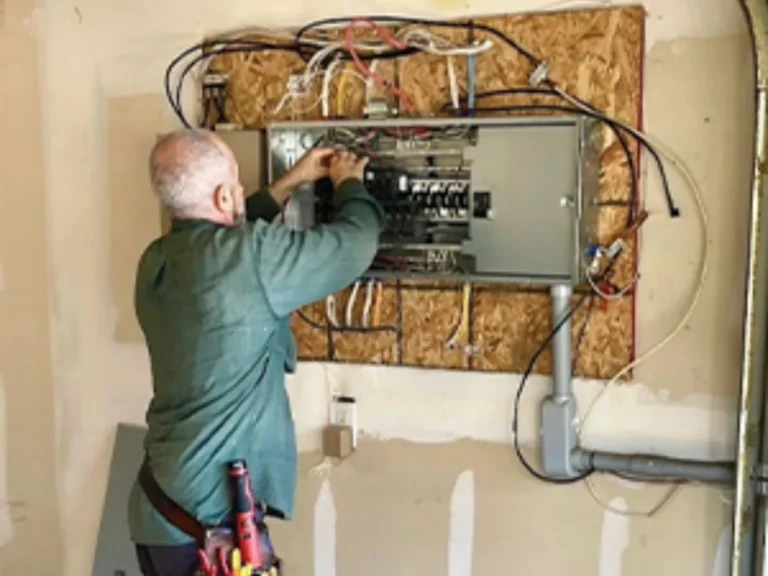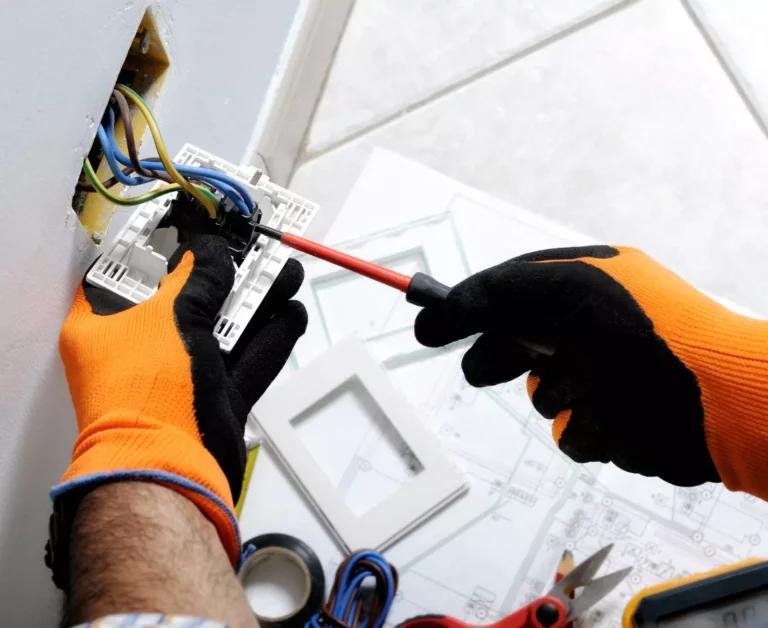Key Signs Your Home Needs Electrical Repairs
Electricity: it’s the lifeblood of our homes, silently pulsing behind walls, beneath floors, and above our heads, powering everything from the smallest gadget to the largest appliance. Yet, despite its crucial role in our daily lives, the electrical system is often taken for granted—until something goes wrong. I’m here to talk to you, not just as an expert electrician but as a fellow homeowner, about the key signs your home needs electrical repairs. It’s essential to catch these signs early, as they can lead to more significant issues down the line, including safety hazards that no one wants to deal with.
In our homes, nestled within the bustling heart of Canadian cities or the serene outskirts, electrical issues can manifest in ways that are subtle yet significant. From flickering lights to an unexpected shock from a seemingly benign appliance, these signs are your home’s way of crying out for attention. Drawing from years of experience and countless service calls across homes like yours, I’ve put together a comprehensive guide to help you identify and understand these critical signals. Our journey through the ins and outs of home electrical repairs will arm you with the knowledge to protect your home, your family, and your peace of mind.
Understanding Your Home’s Electrical System
Before we delve deeper into the signs signaling the need for electrical repairs, let’s first understand the backbone of your home’s electricity supply. The electrical system in your home is a meticulously designed network comprising wires, outlets, switches, and an electrical panel. This network’s primary role is to distribute power safely and efficiently across your living spaces, ensuring that electricity is readily available wherever and whenever you need it.
Key Components of Your Home’s Electrical System:
- Electrical Panel: Think of this as the control center for your home’s electricity, distributing power across various circuits.
- Circuits: Each circuit is akin to a dedicated route of electricity, designed to supply power to specific areas or appliances in your home.
- Outlets and Switches: These are the access points where you connect and control your electrical devices and lighting.
The Significance of Knowing Your System:
Gaining familiarity with your electrical setup not only empowers you to spot issues early but also enhances your communication with professionals when it’s time for repairs or maintenance. It’s the first step toward taking proactive care of your home’s electrical health.
Early Warning Signs of Electrical Problems
Maintaining vigilance over your home’s electrical well-being is crucial. Below are the tell-tale signs indicating that your electrical system might be in distress:
- Flickering or Dimming Lights: This could signal overloaded circuits or potential wiring flaws.
- Frequent Circuit Breaker Trips: A sign that a circuit might be overburdened, posing a risk of overheating or even fire.
- Buzzing Sounds from Outlets or Switches: Such noises could indicate improper wiring or loose connections needing urgent attention.
- Burning Smell from Outlets or Switchboards: This is a serious warning of overheating wires and an immediate call to action.
- Electrical Shocks from Appliances or Switches: Experiencing shocks, however mild, could highlight significant grounding issues.
Spotting these signs promptly can avert the escalation of electrical issues, protecting your home and loved ones from potential dangers associated with electrical malfunctions.
The Dangers of Ignoring Electrical Repairs
Neglecting the early warning signs of electrical issues can lead to dire consequences. Here’s what’s at stake:
- Fire Hazards: Faulty electrical systems are a leading cause of home fires. Ignoring signs of trouble could put your home at risk.
- Electrical Shocks: The risk of injury from electrical shocks increases with neglected electrical maintenance.
- Property Damage: Over time, unresolved electrical problems can cause damage to appliances and home infrastructure.
DIY vs. Professional Electrical Repairs
While the DIY approach may be tempting for minor home projects, electrical repairs often require a professional touch. Here’s why:
- Safety: Electricians are trained to handle hazardous situations safely.
- Expertise: Professionals have the experience to diagnose and fix complex issues efficiently.
- Compliance: Electrical work must adhere to strict codes and standards, particularly in Canada.
When to Call A Professional:
- You’re dealing with frequent breaker trips.
- You notice a persistent burning smell from outlets.
- Your home has aluminum wiring, known for its safety risks.
A side-by-side comparison of DIY vs. professional electrical repair
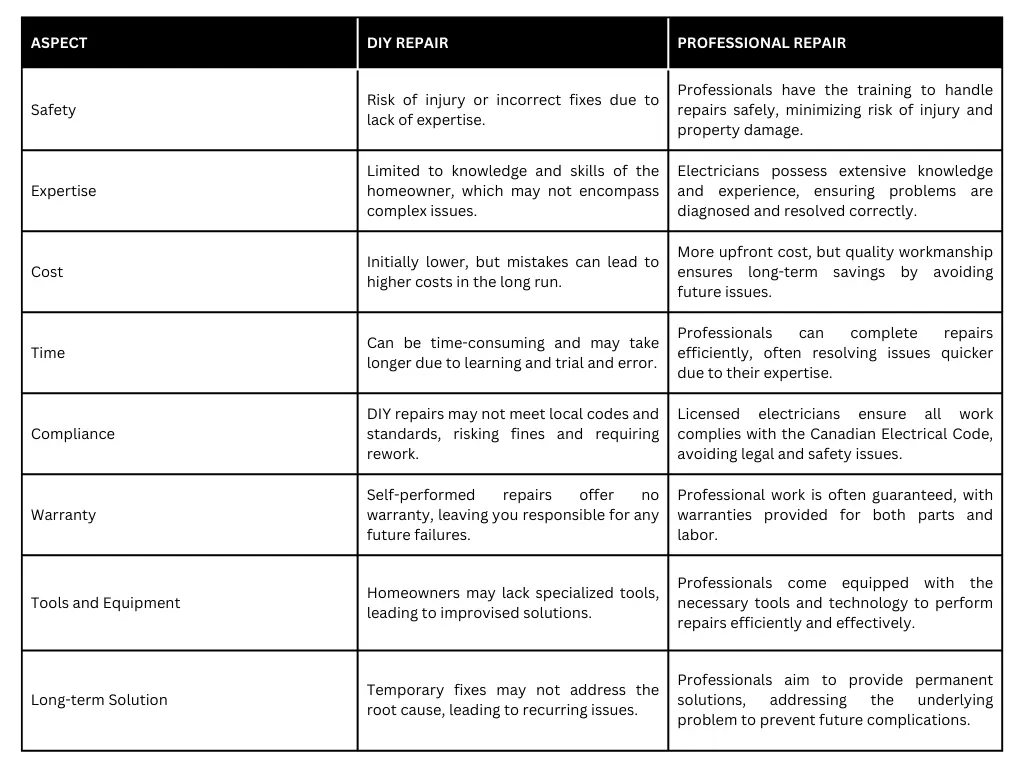
Finding A Qualified Electrician in Canada
When it’s clear that professional help is needed, the next step is to ensure you’re hiring the right person for the job. Here’s how to find a qualified electrician who can safely and effectively address your home’s electrical issues:
Tips for Hiring an Electrician:
- Check for Licenses and Certifications: In Canada, electricians must be licensed to practice. This ensures they have the necessary training and knowledge.
- Read Reviews and Ask for References: Look for electricians with positive reviews and ask them for references from previous jobs.
- Get Multiple Quotes: Don’t settle for the first quote you receive. Comparing quotes can help you understand the market rate and scope of work.
Preventative Measures to Avoid Electrical Repairs
Prevention is always better than cure, especially when it comes to your home’s electrical system. Here are some preventative measures to help avoid the need for repairs:
- Regular Inspections: Have a professional inspect your electrical system every few years to catch potential issues early.
- Upgrade Outdated Systems: If your home is old, consider upgrading electrical panels and wiring to meet current standards.
- Use Surge Protectors: Protect your electronics and appliances from voltage spikes with surge protectors.
Energy Efficiency and Your Electrical System
An efficient electrical system not only reduces the risk of repairs but also can significantly lower your energy bills. Here’s how to ensure your system is as energy-efficient as possible:
- LED Lighting: Replace incandescent bulbs with energy-efficient LED bulbs.
- Smart Appliances: Invest in appliances with a high energy efficiency rating.
- Regular Maintenance: Keeping your electrical system in top condition can prevent energy wastage.
Understanding Electrical Repair Costs
The cost of electrical repairs can vary widely depending on the scope of work. Here’s what you should know about budgeting for repairs:
- Minor Repairs: Simple fixes might be relatively inexpensive but can prevent bigger issues later on.
- Major Upgrades: Rewiring a house or upgrading a panel is a significant investment but crucial for safety and efficiency.
- Cost Factors: Labor, materials, and the complexity of the job will all influence the final cost.
Cost Guide: Electrical Repairs & Upgrades
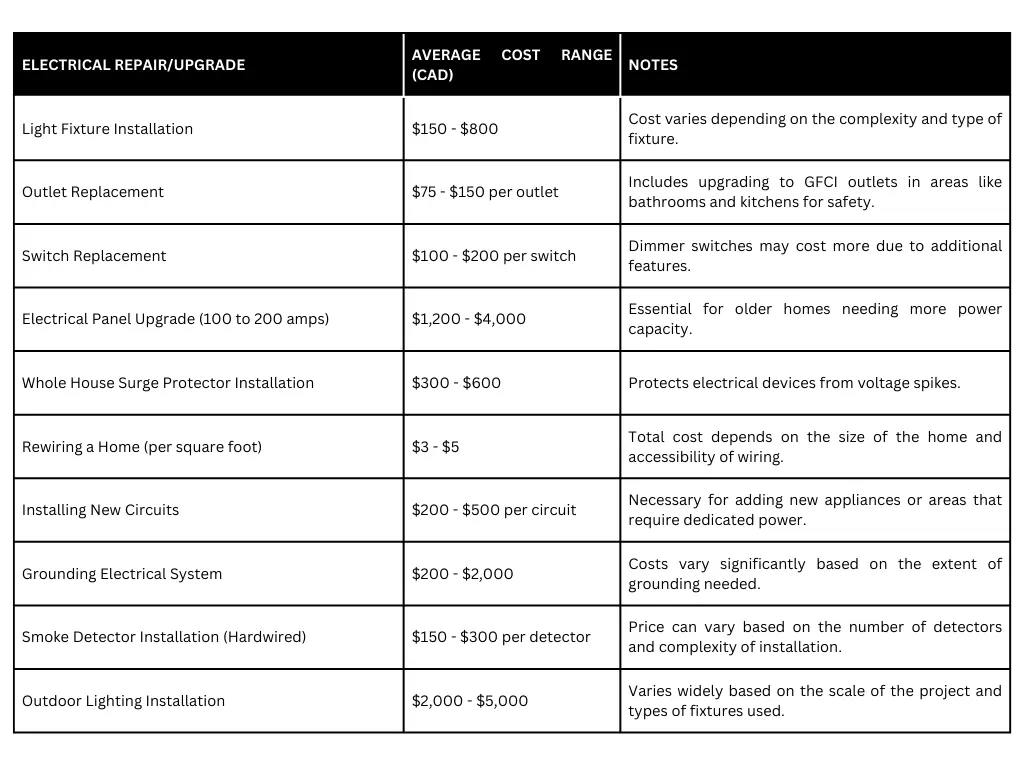
Legal and Safety Considerations for Electrical Repairs in Canada
Understanding the legal requirements and safety standards for electrical work in Canada is crucial:
- Canadian Electrical Code (CEC): Familiarize yourself with the CEC, which sets the standards for electrical work in Canada.
- Permits: For major electrical projects, a permit may be required. This ensures the work is inspected and meets safety standards.
- DIY Limitations: Remember, some electrical work should never be DIY due to safety risks and legal restrictions.
Common Myths About Electrical Repairs
Let’s debunk some common myths surrounding electrical repairs to ensure you’re well-informed:
- Myth: “It’s cheaper to do it myself.”
- Reality: DIY can be more costly if it leads to mistakes that require professional correction.
- Myth: “All electricians are the same.”
- Reality: Experience, specialization, and credentials can vary widely among professionals.
Wrapping Up
Electrical safety in your home is paramount. Recognizing the key signs your home needs electrical repairs and taking timely action can prevent hazards, save money, and ensure your home’s electrical system operates smoothly. Whether it’s addressing minor issues before they escalate or understanding when to call in a professional, being proactive about your home’s electrical maintenance is a responsibility that cannot be overlooked.
If you’ve noticed any of the signs discussed, don’t wait. Contact a licensed electrician to inspect your home’s electrical system today.
